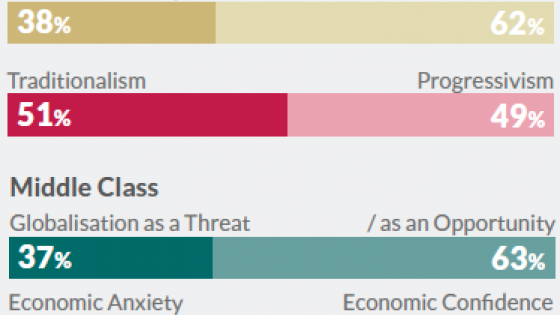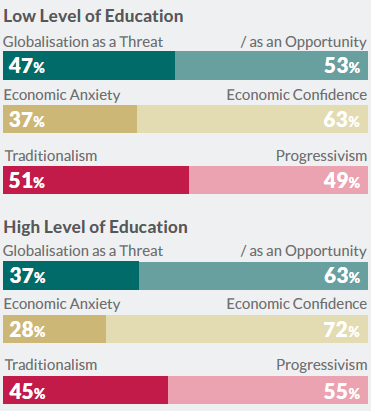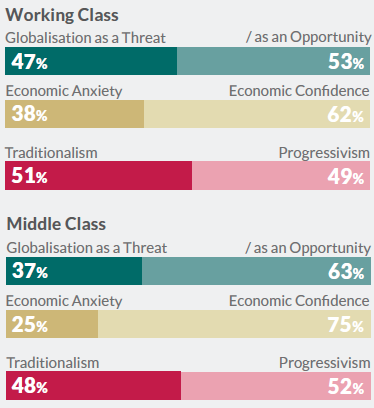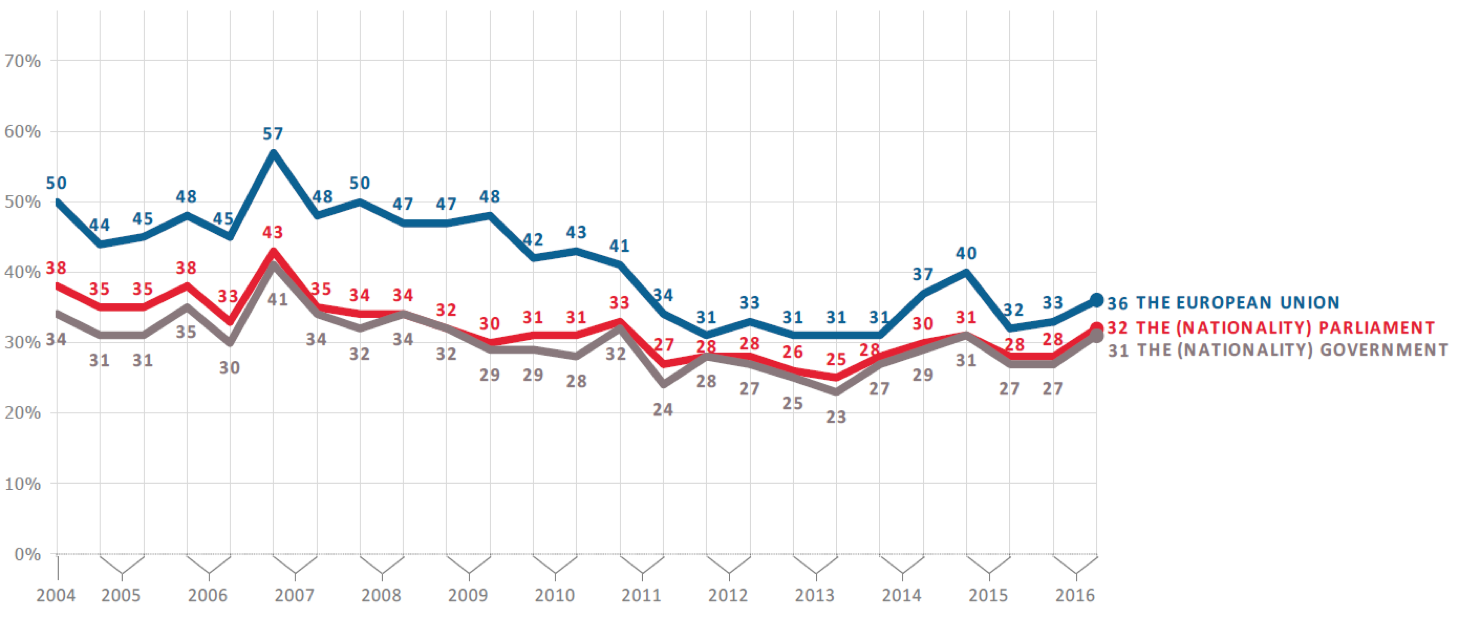EU institutions and policy settings are prone to populist attack from both the purely economic and the more cultural ‘nativist identity’ angle. Current competences, mostly confined to organising markets and lacking the ability to address distribution effects, make the EU appear as the agent of globalisation within Europe, rather than a joint European response to globalisation. At the same time, it is charged with undermining national autonomy, identity, and control. Against that background, we set out five guiding principles for policy articulation at the EU level for a new positive EU narrative.
The tide has turned
After a decades-long process where national economies became more and more entangled and interdependent at both the international and regional level, increasing strains to economic integration are evident both at the global and the European level. Examples abound – even without mentioning Brexit or the 45th US president – from rising stress in international capital and currency markets to protectionist pressures of all sorts on domestic markets coupled with a rising tide of nationalistic, actually often nativist, go-alone policy approaches. What is at stake is huge as the spectre of disintegration is raising its ugly head and, in fact, an integration process that has been the bedrock of a half-century of peace and economic development can no longer be taken for granted.
The current rise in populist parties is a wake-up call resembling what the late Ralf Dahrendorf – a major scholar of the 20th century and a former member of the European Commission – summarised a little more than 20 years ago as a quandary between globalisation (as a means towards growth), social cohesion and political freedom:
"To stay competitive in a growing world economy [the OECD countries] are obliged to adopt measures which may inflict irreparable damage on the cohesion of the respective civil societies. If they are unprepared to take these measures, they must recur to restriction of civil liberties and of political participation bearing all the hallmarks of a new authoritarianism (…) The task for the first world in the next decade is to square the circle between growth, social cohesion and political freedom" (Dahrendorf 1995).
Indeed, the EU integration process has traditionally been conceived as a means to square the circle, allowing for catching-up economic growth and convergence (the EU as a great "convergence machine"; Indermit and Raiser 2012), while preserving Europe's social model(s) as reflected in the EU social acquis. However, while the deepening globalisation and integration process has generated overall income gains via higher static and dynamic efficiency, in combination with skill-biased technical progress, it has almost certainly not been Pareto-optimal, creating winners (take-it all) and losers in an age of massive transformation. The financial crisis and its fall-out have only fuelled an already existing undercurrent of discontent and fading trust in democratic institutions and the so-called ‘elites’ to deal with the (real or imagined) unfair distribution of gains and burdens in society. In this context, EU institutional settings and policies have been increasingly perceived as being pro-market biased, paying little attention (if any) to their social impact, and undermining cohesion, solidarity, autonomy, and governability at the national, regional, and local levels. Put succinctly, in Musgrave's Three Functions of Government, the EU is seen as dealing with the allocative and, subordinately the stabilisation function, while not caring about the redistribution function which was largely left to member states.1
A populist backlash with economic and cultural roots
The backlash against globalisation and integration runs deeper than cheap populism, as it is nurtured by economic and cultural roots that should not too easily be dismissed.
New trade agreements face fierce opposition almost everywhere. TTP, TTIP, CETA – acronyms such as these, once only known by specialists in the field, have become household names and prominent issues in election campaigns. And unfettered market opening policies have lost a lot of their appeal with a growing recognition that the rising tide has not lifted all boats; on the contrary, in some cases perhaps even only a few super-yachts. Losers in the globalisation process have become clearly visible, while the middle classes have seen scant evidence of the gains once promised. Over the past decade, political scientists and economists have amassed a considerable body of survey evidence which shows that ordinary peoples’ attitudes towards globalisation and integration are exactly what Heckscher-Ohlin economics would predict (Figure 1). Thus, while globalisation may not actually be the main culprit, there is nothing populist about noticing that the past decades have seen the top 1% grab an ever-larger share of national income and wealth – a trend particularly pronounced in the US – while median incomes have stagnated.2
Protectionism, if not to say outright hostility, already rules the day when it comes to immigration. The arrival of migrants is perceived as threat that diminishes or dilutes the locational premium enjoyed by citizens of host countries, which includes not only possible direct economic impacts on jobs and wages, but also good health and education services, and public goods like the preservation of national culture and language. Arguably, the fears about ‘native identity’ posed by immigrants from a different ethnic, cultural, and religious background largely dominate the public debate and are often ruthlessly exploited by populists; thus, pro-immigration arguments that it may have long-run positive economic effects tend to fall on deaf ears.
Figure 1 Working class and low-skilled people tend to see globalisation as a threat
Source: Bertelsmann Stiftung (2016)
It has to be acknowledged that some of the attack lines by populists are derived from a response to real grievances; and not everyone who criticises elites is a populist, and not everyone who worries about immigration is a racist. But populists do not talk in terms of disagreement over policy, which in a democracy is the very point of politics; rather they claim that they and they alone speak in the name of what they tend to call the 'real people' as opposed to the 'establishment' (Müller 2016). This is coupled with assurances to restore autonomy, identity, and control, which were taken away from citizens by hostile forces. The identity offer of the ‘us, the honest (native) ordinary people, versus them, the corrupt elites’ is very powerful and tempting in an era of massive transformation where, to use a term coined by Zygmunt Bauman, many people are left to lead a ‘liquid modern life’ amidst multiple insecurities threatening the social fabric.3
The populist promise to restore autonomy, identity, and control typically comes with disrespect for rules and procedures, disparaging the in-built checks and balances of representative democracy while propagating referenda and other elements of direct democracy to implement ‘the true will of the people’. In this context, ridiculing expert opinion (admittedly sometimes made all too easy) and denouncing statistical evidence as abstract and not in line with the experience of ordinary people (‘numbers are liberal’) belongs to the standard repertoire. Populists have also been quick to realise the potential of social media given their (partly real, partly imaginary) offer to create a space of common identity and understanding and to establish a direct link of identification between the individual and its alleged true authentic representative.
The EU and European integration as an easy target for populist onslaught
The EU has become a popular ‘punch bag’, an easy target and prey. It is of little comfort that the EU is often not really the main concern of many of its critics. They use opposition to European integration as a vehicle for their ultimate objective: to strengthen their influence and power at home. But we need to acknowledge that EU institutions and policy settings are prone to populist attack from both the purely economic and the more cultural ‘nativist identity’ angle (Müller 2016).
From an economic perspective, the established policy allocation and the distribution of responsibilities between the EU institutions and the member states (Padoa Schioppa 1987) – with the central level being predominantly focused on growth and efficiency (free trade, open markets, the four freedoms, competition, etc.), while the social dimension was largely left to member states – have made ‘Brussels’ an easy scapegoat, accused of ignoring the social consequences of its policies and, even worse, undermining the capacity of the nation state to deal with them. The EU and populist forces collide as they operate in the same sphere, namely, the market, with the EU aiming at opening and integrating markets internally (Schengen, the single market, labour mobility, competition policy) and externally (trade policies), and populists aiming at closing them. In consequence, the EU is seen as the agent of globalisation, rather than the response to it.
The distributional fault lines are easily identifiable, impacting upon all three dimensions: the pre-market distribution of endowments, the distribution of gross market incomes, and the post-market distribution of net disposable incomes. Integration and open market policies affect the relative scarcities of production factors, with free (embedded) factor flows in integrated markets favouring mobile factors; they propagate (skill-biased) technical progress associated with a globalisation/digital divide, favouring capital and high-skilled labour; and they may enhance dynamic agglomeration effects, thereby increasing high/persistent regional disparities. EU policies and deeper economic and monetary integration increase competitive pressures and enforce higher market flexibility which, if left unattended, may negatively affect working conditions and protection in the market and undermine established rent-seeking and rent-sharing practices. At the same time, the room for re-distributional manoeuvre at the national and local level becomes more limited due to a reduction of discriminatory and enforcement power, enhanced system competition effects, and, last but not least, the perception of fiscal rules as a straight-jacket rather than as a safety vest. Identifying the EU exclusively with the market dimension and disregarding its potential role in the pre-market and post-market field would accentuate the distance with citizens and open the way for the populist attack.
Similarly, a number of elements fuel anti-EU sentiments from a nativist-identity perspective. Charges of ‘homogenisation’ undermining, or even erasing, national specifics and identity are commonly brought up by populists mainly on the right side of the political spectrum. At the same time, the transfer of national autonomy and decision rights to EU institutions and bodies evidently shifts democratic control further away from national electorates. This is associated with a significantly higher complexity of mediation and, thus, intransparency of decision-making at the EU level, thereby increasing the distance to the ordinary citizen. A rules-based and institutions-based system, instead of being perceived as a guarantee for equal treatment and protection of minorities, is seen as an additional layer between ruler and the people. The inevitable loss of input-legitimacy[iv] from a national perspective can easily be transformed into allegations of eroding the sovereignty of the member state and the will of its citizens, eventually leading to the populist call ‘to take back control’. Moreover, the often highly technical issues to be resolved at the central level make it easy to depict EU policies as designed by soulless technocrats detached from the life of ordinary people and accused of ‘fake’ policy-based, pre-determined evidence-making. It is of little consolidation in this context that trust in the EU has actually held up better than trust in national institutions.
Figure 2 Trust in the EU versus national institutions
Source: Eurobarometer December 2016
Output legitimacy has clearly suffered as well, given the hesitant and still incomplete reaction to the financial crisis and its fallout, or the difficult handling of the migration/refugee issue. Protection of minorities and upholding the rights of citizens such as free movement of people – a stronghold of EU policies – can without much difficulty be construed as running against the will of ‘the no longer silent majority’. Enhanced by national politicians’ tendency to blame ‘Brussels’ for some of their own failings and their reluctance to give the EU credit for its successes, we witness widespread frustration with the EU's ability to tackle the poly-crises we are confronted with.
Conclusions: Some guiding principles for a new positive EU narrative
Unfortunately, there is no quick fix. A sustained period of growth and rising incomes would help. So, too, would proactive policies to cushion the impact of liberalisation on the losers. But the present politics of middle class discontent demands a broader response to restore the trust in the European project. As long as EU integration is seen as a project of the political elites and the rich, it will carry the seeds of its own destruction. The growing polarisation in our societies needs to be addressed by finding better ways to combine the benefits of open markets and integration with democratic inclusion, social protection and fairness. Rebalancing is even more complicated in the EU integration context, where the divide between winners and losers does not merely follow the traditional fault lines along the functional and the personal distribution of income and wealth, but often also carries strong nationalistic connotations of north-south and east-west conflict.
Today's reality calls for a rethink of the requirements of the subsidiarity principle in the EU, aiming to ensure that decisions are taken as closely as possible to the citizen and correctly identifying and redefining the areas where action at EU level is justified and needed in light of the possibilities available at the national, regional, or local level.
Against that background, we set out five guiding principles for policy articulation at the EU level to foster political stability, social cohesion and integration.
1. Focus on delivering the common public goods in need of well-defined EU value added.
This involves strengthening security both at Europe's external borders and internally, including a shared migration, asylum, and refugee policy worthy of the name. Tackling the environmental challenge is another area where go-alone policies are obviously bound to fail. International cooperation will also be required to fend off protectionist tendencies, wherever they originate, and to defend European interests in the global economy. And obviously, economic security starts at home with safeguarding and extending the Single Market achievements, completing the Banking Union, and taking the necessary steps to ensure the sustainability of EMU.
2. Re-establish the core values of the European social model as a joint response to globalisation.
The EU’s social acquis already provides a floor of social rights, protecting worker's health and safety, equal treatment and job security. However, in response to remaining gaps, allegations of ‘social dumping’, and the many new demands in a rapidly changing world of work, a critical reflection is needed; and, consequently, work on establishing a European Pillar of Social Rights is under way.
3. Mainstream distributional considerations into EU policy designs.
While acknowledging that social fairness is primarily a domestic challenge, in the EU's monitoring and surveillance processes more focus needs to be given to distributional issues. Stronger emphasis on the quality of public finances also contributes to higher intergenerational fairness and more tangible and intangible investments. The EU has become a strong actor in common strives for fairer taxation systems, as evidenced, for example, by current efforts to tackle profit shifting, tax evasion and the erosion of tax bases, and the use of competition policy instruments to address tax benefits granted selectively to companies.
4. Embody the new requirements derived from the subsidiarity principle in the EU budget.
The EU budget, albeit limited in size, is one of the main tools for the EU to achieve its objectives. Thus, it is vital to ensure ‘vertical consistency’ between European and national actions budgets (Buti and Nava 2003). The recent crises have put extra pressure on the EU budget; they have also pointed to areas where EU action and delivery of common public goods is the most pertinent (see principle (i)). A dedicated fiscal capacity for the Eurozone could not only add to the macroeconomic stability properties of EMU, it could at the same time serve distributional functions, be it in support of social investment or in the form of unemployment benefit funds.
5. Ensure transparency and democratic accountability over the course of decision-making.
The EU’s activities today affect millions of European citizens’ lives. The decisions having an effect on them must be taken as openly as possible. Admittedly, this is easier said than done, and despite many efforts to increase transparency, the perception of EU decisions as being driven by lobbying activities and backroom deals is widespread. There are many ways to streamline decision-making processes, making them more easily comprehensible. It is also essential that responsibilities of ‘Brussels’ and the national legislators are clearly identified, so that accountability – ultimately, the decision of citizens to re-elect officials – can be exercised at the right levels.
Implementing these principles will not silence the populists, but it will hopefully take the wind out of their sails to some extent. Such an effort also requires that mainstream political parties across Europe do not give in to the populist version of ‘blaming Brussels’ for difficult decisions to be taken domestically. Embracing the European project for what it is, namely a democratic endeavour to preserve and strengthen values shared by all European traditions, is even more essential in a time when international cooperation seems to be fading away.
Editors’ note: This column is a shortened and slightly revised version of a Policy Brief, LUISS School of European Economy, January 30, 2017. The views expressed in this article are personal and should not be attributed to the European Commission or its services.
References
Bertelsmann Stiftung (2016), ”Fear not Values. Public opinion and the populist vote in Europe”, eupinions #3.
Dahrendorf, R (1995), “Economic Opportunity, Civil Society and Political Liberty”, UNRISD Discussion Paper 58.
Gill, I and M Raiser, (2012), Golden growth: restoring the lustre of the European economic model, World Bank.
Milanovic, B (2016), Global Inequality – A New Approach for the Age of Globalization, Harvard University Press.
Müller, J-W (2016), "Capitalism in One Family", London Review of Books 38(23): 10-14
Padoa Schioppa, T (1987), Efficiency, Stability, and Equity: A Strategy for the Evolution of the Economic System of the European Community. A Report (with Michael Emerson et al.), Oxford University Press.
Scharpf, F (1999), Governing in Europe: effective and democratic?, Oxford University Press.
Schmidt, V (2013) “Democracy and Legitimacy in the European Union Revisited: input, output and throughput”, Political Studies 61(1).
Endnotes
[1] Obviously, the EU budget and its associated net cross-country transfers also perform some redistribution function, but it is very limited and mainly geared at the regional, rather than the interpersonal level.
[2] The ‘elephant chart’ of income distribution has become a reference point for the debate on the global inequality (Milanovic 2016).
[3] In the 1990s, Bauman coined the term "liquid modernity" to describe a contemporary world in such flux that individuals are left rootless and bereft of any predictable frames of reference. In books including Liquid Times and Liquid Modernity, he explored the frailty of human connection in such times and the insecurity that a constantly changing world creates where traditional institutions no longer fill the wells of common understanding and experience.
[4] The term goes back to Fritz Scharpf (1999) who introduced the distinction between input legitimacy of governance, i.e. the responsiveness to citizen concerns as a result of participation by the people; and output legitimacy, i.e. the effectiveness of policy outcomes for people. Vivien Schmidt (2013) later added the concept of throughput legitimacy, i.e. the governance processes that happen in between input and output.






